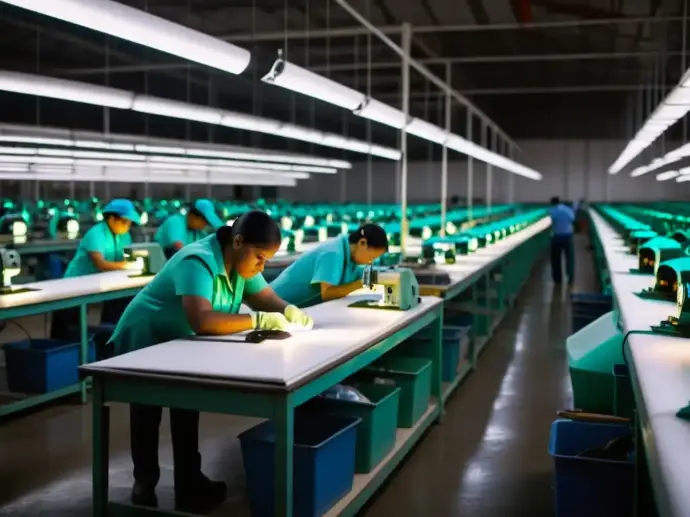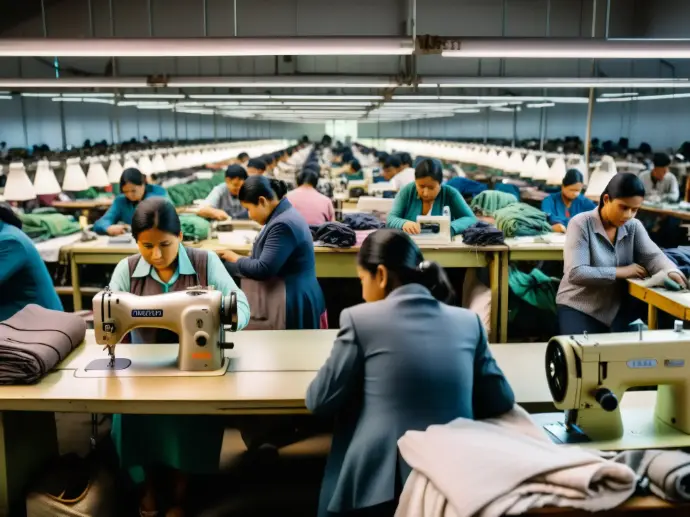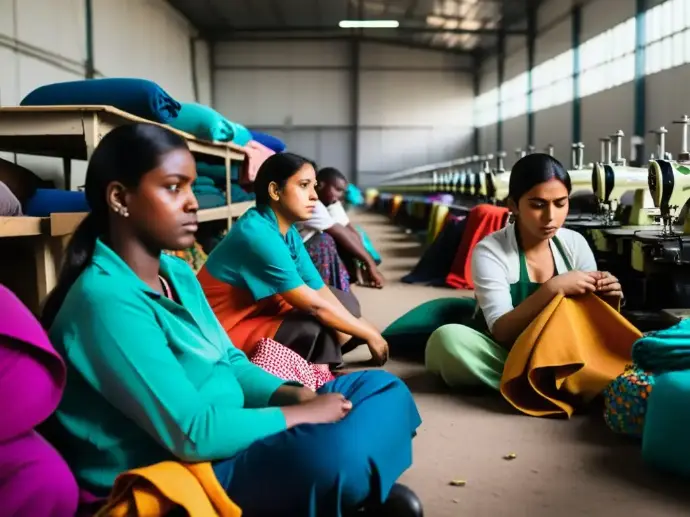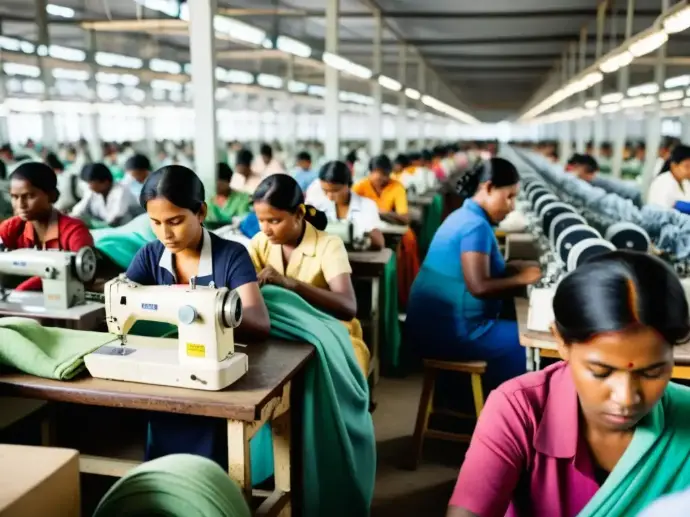The Dark Side of Global Trade: Labor Exploitation and Human Rights

In our topic "The Hidden Face of Global Trade: Labor Exploitation and Human Rights," we'll explore the shocking reality of labor exploitation in global trade. Prepare for a deep dive that reveals the harsh truth behind the global economy. Don't miss this eye-opening exploration and discover how labor exploitation affects human rights in the economy!
Introduction
Globalization has had a significant impact on human rights, especially in the workplace. As companies seek to reduce costs and expand their global reach, conditions have arisen that foster labor exploitation. The lack of effective regulations and unbridled competition have led to situations where workers' fundamental rights are violated.
Globalization has facilitated the mobility of production, leading companies to relocate their operations to countries with cheap labor and lax regulations. This has created an environment conducive to labor exploitation, where workers are forced to accept precarious conditions, low wages, and long hours, without access to social security or union rights.
Furthermore, globalization has increased pressure on governments to reduce labor regulations and relax laws in order to attract foreign investment. This has weakened the protection of labor rights and contributed to the proliferation of labor exploitation in global trade.
Labor exploitation in global trade refers to the practice of subjecting workers to abusive conditions in order to obtain economic benefits at the expense of their rights and dignity. This can include unfair wages, excessive working hours, lack of workplace safety measures, discrimination, among other forms of violation of fundamental labor rights.
In the context of global trade, labor exploitation manifests itself in the outsourcing of production to countries with weak labor laws, where companies can evade responsibilities and take advantage of cheap labor. This practice particularly affects vulnerable workers, such as women, children, and migrants, who are often the most exposed to exploitation and abuse in the workplace.
Labor exploitation in global trade not only affects the workers directly involved but also has repercussions for the economy, society, and the environment. Unfair competition based on labor exploitation distorts the market, perpetuates social inequality, and contributes to environmental degradation, generating a negative impact globally.
Labor exploitation in global trade is not a new phenomenon; it has its roots in the history of industrialization and the expansion of international trade. During the Industrial Revolution, for example, massive exploitation of workers in factories and mines was evident, where working conditions were extremely harsh and workdays often endless.
With the advance of globalization, this problem has spread worldwide, affecting millions of workers in different productive sectors. Despite advances in labor legislation and the efforts of human rights organizations, labor exploitation persists in global trade, highlighting the complexity and magnitude of the challenge it represents for contemporary society.
To effectively address labor exploitation in global trade, it is crucial to understand its historical evolution and the factors that have contributed to its persistence in the current context. Only through a thorough analysis and coordinated international action will it be possible to move toward eradicating this problem, which violates fundamental human rights.
Labor Exploitation in Global Trade
Labor exploitation in the global supply chain manifests itself in various forms, some of the main ones being child labor, lack of safe and fair working conditions, gender discrimination, and lack of fair pay. These practices are perpetuated in sectors such as agriculture, the textile industry, mining, and manufacturing, where workers often face long hours, low wages, and unsafe conditions that violate their dignity and fundamental rights.
Child labor is one of the most harrowing forms of labor exploitation in the global supply chain. Millions of children are forced to work in dangerous conditions that are detrimental to their physical and mental development, depriving them of their right to education and a decent childhood. This reality significantly impacts the lives of these children, perpetuating a cycle of poverty and inequality that affects the communities in which they live.
Gender discrimination is also a deep-rooted problem in the global supply chain, where women often face lower wages, sexual harassment, lack of access to reproductive health services, and fewer opportunities for professional advancement. This injustice not only violates women's human rights but also limits the potential for economic and social growth in affected communities.
Labor exploitation not only affects the lives of the workers directly involved, but also has a devastating impact on the communities in which global supply chains operate. The lack of fair and safe working conditions leads to precarious work, increased poverty and social inequality, and the marginalization of vulnerable groups such as women and children.
Furthermore, labor exploitation in global trade contributes to the degradation of the natural environment, as companies that resort to unfair labor practices often also ignore environmental regulations, negatively impacting the biodiversity and natural resources of the communities in which they operate. This situation not only violates people's human rights but also threatens long-term environmental sustainability.
The psychological and emotional impact on workers who suffer from labor exploitation is significant, as they are subjected to abusive working conditions that affect their mental health and overall well-being. The lack of autonomy, constant pressure, and fear of retaliation create a toxic work environment that permeates the daily lives of workers and their families, perpetuating a cycle of vulnerability and inequality.
Economic globalization has fostered an environment in which companies seek to reduce costs and maximize profits, often at the expense of labor and human rights. The outsourcing of production and the fragmentation of supply chains have led to greater opacity in working conditions, facilitating the exploitation of workers in different regions of the world, far from public scrutiny and effective regulation.
Global competition and the pressure to offer products at increasingly lower prices have led many companies to resort to unfair labor practices to remain competitive in the market. This dynamic has contributed to the perpetuation of labor exploitation in the global supply chain, creating a vicious cycle in which workers are sacrificed for the sake of corporate profitability.
The lack of effective global regulation and the absence of mechanisms for monitoring and enforcing labor rights have allowed labor exploitation to persist in the era of economic globalization, highlighting the need for internationally coordinated action to ensure fair working conditions that respect human rights at all stages of the global supply chain.
In the context of globalization and global trade, international standards and regulations play a crucial role in protecting labor rights and preventing labor exploitation. The International Labor Organization (ILO) is one of the leading international standards-setters to promote fair and decent working conditions worldwide. The ILO has adopted numerous conventions and recommendations that directly address labor exploitation, including the abolition of forced labor, the elimination of child labor, equal pay, and freedom of association. These standards provide a comprehensive framework for addressing unfair labor practices and protecting workers' fundamental rights in the context of global trade.
In addition to the ILO, other international organizations, such as the World Trade Organization (WTO) and the United Nations, have developed standards and guidelines that have significant implications for the protection of labor rights in the context of global trade. For example, within the framework of the WTO, issues related to trade and labor have been discussed, with the aim of ensuring that trade practices do not undermine labor standards. Furthermore, the Universal Declaration of Human Rights and other international human rights treaties establish fundamental principles that protect individuals from labor exploitation and promote fair and safe working conditions.
Importantly, the effective implementation of these international standards and regulations requires active cooperation among governments, international organizations, businesses, and civil society. Monitoring, compliance, and enforcement of these standards are essential elements to ensure that labor rights are respected in the context of global trade and that labor exploitation is effectively combated in all its forms.
Human Rights in the Global Supply Chain
The global supply chain is a complex network involving multiple actors, from suppliers and manufacturers to distributors and retailers, with operations spanning the globe. In this context, the protection of human rights represents a monumental challenge, as working conditions are often precarious and vulnerable to exploitation. The lack of effective regulations and the lack of transparency in the operations of many companies have allowed labor exploitation to persist in various sectors, from the textile industry to food and electronics production.
The global supply chain is an interconnected network that often spans multiple countries, making it difficult to monitor and enforce labor standards. The complexity of this chain, coupled with the pressure to reduce costs and maximize efficiency, has contributed to the perpetuation of unacceptable working conditions in many companies involved in global trade.
In this context, the protection of human rights in the global supply chain has become an issue of growing importance, with an urgent call for action from governments, international organizations, businesses, and civil society to address this issue in a comprehensive and sustainable manner.
Business ethics and corporate social responsibility play a fundamental role in the protection of human rights in the global supply chain. Companies that adopt an ethical approach to their operations and assume the responsibility to respect labor rights contribute significantly to promoting fair and equitable working conditions throughout the supply chain. The implementation of codes of conduct, social audits, and grievance mechanisms are key tools for ensuring respect for human rights in a globalized and highly complex business environment.
Transparency in operations, collaboration with suppliers, and accountability are essential elements of strong business ethics and effective corporate social responsibility. Companies that prioritize the well-being of their workers at all stages of the supply chain not only positively impact the lives of thousands of people, but also strengthen their reputation and position in the global marketplace.
It is crucial that companies make a firm commitment to business ethics and corporate social responsibility, recognizing their influence and ability to drive significant change in the protection of human rights in the context of global trade.
Non-governmental organizations (NGOs) play a critical role in defending labor rights in the global supply chain. Through research, monitoring, and advocacy, NGOs have exposed numerous cases of labor exploitation and advocated for concrete measures to ensure decent working conditions that respect human rights at all stages of the supply chain.
NGOs also work closely with companies, governments, and international organizations to develop and promote strong labor standards, effective compliance mechanisms, and independent monitoring systems. Their work is essential to driving meaningful change, raising public awareness, and pressuring key stakeholders to assume their responsibility to protect human rights in the context of global trade.
NGOs' work in defending labor rights is essential to ensuring that business practices respect international human rights standards and to providing support to workers facing exploitation or abuse in their workplaces. Their contribution is essential to moving toward a more just, equitable, and human rights-respecting global supply chain.
While significant progress has been made in the protection of human rights in the global supply chain, significant challenges remain that require urgent attention. Lack of transparency, abusive subcontracting, pressure to reduce costs at the expense of workers, and limited oversight capacity in transnational environments are just some of the challenges that must be addressed decisively and in a coordinated manner.
It is critical that governments strengthen regulation and oversight of supply chains, implementing effective mechanisms to prevent and punish labor exploitation. Likewise, companies must assume their responsibility to respect human rights and adopt ethical business practices that center the well-being of workers at all stages of global production and distribution.
Collaboration between governments, businesses, non-governmental organizations, and civil society is essential to overcome existing challenges and promote a global supply chain that fully respects human rights. Only through a comprehensive and collaborative approach will it be possible to move toward a global trading system that is more fair, equitable, and respectful of human dignity.
Impact on communities and the environment
Labor exploitation in global trade has devastating consequences for local communities. Workers face precarious working conditions, unfair wages, and long hours. This not only affects their quality of life but also negatively impacts the community's social cohesion. Labor exploitation leads to inequality, poverty, and lack of access to basic services, creating a vicious cycle that traps communities in marginalization and social exclusion.
Furthermore, labor exploitation in global trade also has a significant economic impact. Although companies benefit from low labor costs, local communities experience a decline in their quality of life and opportunities for economic development. The lack of investment in worker well-being and local development perpetuates inequality and hinders the sustainable economic progress of these communities.
It is essential to address labor exploitation in global trade from a comprehensive perspective, considering both the social and economic implications affecting local communities.
In the context of global trade, sustainable development and environmental protection are essential to ensuring an equitable and prosperous future for future generations. However, labor exploitation in the global supply chain is closely linked to environmental degradation. Poor working conditions and the overexploitation of natural resources go hand in hand, generating a devastating impact on the environment.
Exploitative labor practices are often associated with a lack of environmental regulations, leading to air, water, and soil pollution. Furthermore, deforestation, biodiversity loss, and the generation of toxic waste are direct consequences of a global trade model that prioritizes profit maximization at the expense of the environment and local communities.
To achieve sustainable development in the context of global trade, it is imperative to address the relationship between labor exploitation, human rights, and environmental protection. Only through a comprehensive approach that considers these interrelated aspects can we move toward a fairer and more sustainable global trade model.
Conclusions
Eradicating labor exploitation in global trade presents significant challenges as the world moves toward an increasingly interconnected future. Despite advances in awareness and legislation, problems rooted in the very structure of the global economy persist. A lack of effective regulation, opaque supply chains, and fierce competition for lower costs continue to perpetuate labor exploitation in various sectors. Addressing these challenges will require a multifaceted approach that includes international collaboration, supply chain transparency, and stricter enforcement of labor regulations.
Furthermore, it is crucial to recognize that upholding human rights in a globalized context is essential to ensuring the dignity and safety of workers worldwide. As economies become increasingly intertwined, the protection of human rights must not stop at national borders but extend throughout the entire global supply chain. Promoting fair labor standards, transparency in business practices, and accountability are fundamental components of safeguarding human rights in a globalized environment.
The eradication of labor exploitation in global trade and the defense of human rights worldwide are interconnected challenges that require continued commitment and a comprehensive approach. Only through concerted collaboration between governments, businesses, non-governmental organizations, and civil society can significant progress be made toward a world where human dignity is respected at all stages of the global supply chain.

 IHRO NEWS
IHRO NEWS

